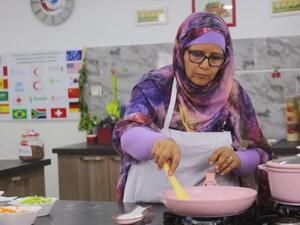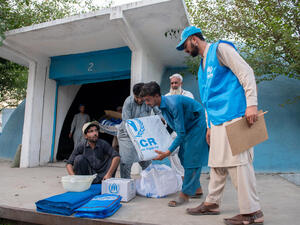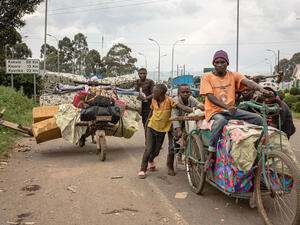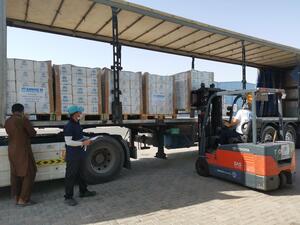UNHCR delivers aid to Yemen by sea, prepares stepped-up assistance ahead of expected ceasefire
UNHCR delivers aid to Yemen by sea, prepares stepped-up assistance ahead of expected ceasefire

Children play as a donkey cart passes destroyed buildings in the Al-Ora's neighbourhood of Zinjibar.
GENEVA, May 12 (UNHCR) - A UN refugee agency shipment of aid has arrived by sea in the Yemen port of Hodeida carrying blankets, sleeping mats and kitchen utensils for 60,000 people while preparing to significantly step up its assistance if a proposed ceasefire comes into effect today.
UNHCR spokesman Adrian Edwards, while welcoming news of the arrival last Friday of the aid in Hodeida, told journalists said: "There is clear and urgent need for aid to reach many more people." He added that UNHCR was making final preparations for a possible huge airlift of humanitarian aid into Yemen's capital, Sana'a, to take place over the next days if the truce comes into effect and holds.
"Hundreds of thousands of people across Yemen are struggling to meet their basic needs and are in desperate need of help," Edwards stressed. The plan for the airlift is for three flights carrying aid from UNHCR stockpiles in Dubai. These will bring 300 tonnes of sleeping mats, blankets, kitchen sets and plastic sheeting - part of a larger aid mobilization under way for a quarter-of-a-million people.
"In addition to the flights, UNHCR will be seeking to distribute more of the aid we already have in Yemen, and to carry out rapid needs assessments in previously hard-to-reach areas. Our staff and partners are preparing to give relief kits out to tens of thousands of displaced people," Edwards said.
This includes those who in recent days fled airstrikes on Sa'ada, about 150 kilometres to the north of Sana'a. Many of these people left on foot, and are living in public buildings. UNHCR teams will be taking relief to 21,000 of the most vulnerable in Amanat Al Asmimah, Amran and Hajjah governorates in north Yemen. In the south, the refugee agency hopes to be able to send more aid to Aden, Lahj, Abyan and Shabwa for 17,500 vulnerable people.
"While a humanitarian pause falls short of the peace so vitally needed in Yemen, it is nonetheless critically important that aid gets through, as existing stocks in country are becoming depleted, adding to the suffering of civilians," Edwards stressed.
UNHCR's plan is to also use any pause in hostilities to transport and preposition aid to Sana'a, Amran, Haradh and Aden for onward distribution to vulnerable populations in surrounding provinces. Medicines and rations will be sent to the Mayfa'a reception centre in the east, and food, kerosene and diesel will be transferred to the Kharaz refugee camp, near Aden.
About 2,000 Somali refugees have moved from urban areas in Aden to the Kharaz camp since the escalation of hostilities six weeks ago. While many of these have been able to move into the shelters of relatives, a growing number of new families have arrived and UNHCR has had to provide additional tents.
"We also hope to redouble our protection activities for refugees and asylum-seekers during the ceasefire. Through our telephone hotlines, our staff has received requests from some migrants who now wish to register as asylum-seekers because of problems they are now facing," the spokesman said.
Many other refugees who previously survived as daily labourers or domestic staff have lost their livelihoods in the conflict and need cash assistance. UNHCR hope to resume meetings with refugee community leaders and other outreach activities.
"For our own staff, many of whom have been forced by the fighting to work from home where electricity is in short supply, we will be distributing solar batteries and panels. Sana'a has gone for days without any electricity, while parts of Aden still have no power at all," Edwards noted.
He added that UNHCR and its humanitarian partners urged all parties to observe the ceasefire in full, to respect international humanitarian law and cease any targeting of civilians or civilian infrastructure, and to allow the urgent delivery of aid.
Across Yemen, more than 300,000 civilians have been displaced in the recent conflict, which has also affected many of the 250,000 mainly Somali refugees in Yemen alongside the 330,000 people already internally displaced by previous waves of conflict. In addition, some 27,000 people of various nationalities have fled the country in the last six weeks to the surrounding region.








